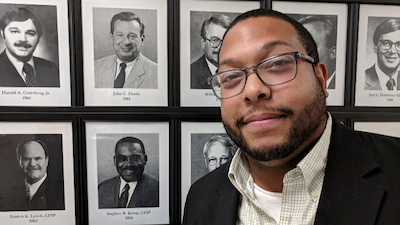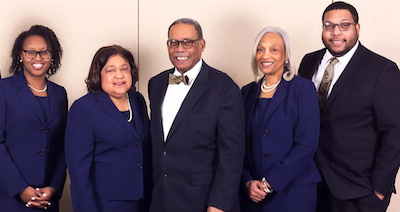Death in the family: Mortuary Science alumnus extends rich funeral home tradition
This story originally appeared in the Wayne State EngageD Community Engagement Newsletter.

Stephen Kemp Jr. stands next to a picture of his dad, Stephen Kemp Sr., in the hallway of the Mortuary Science building. Kemp Jr. is enlisted in a decades-long tradition of family-run and -owned African-American funeral homes.
Stephen Kemp Jr. remembers the first time he realized what his father did for a living. His dad, Stephen Kemp Sr., had just picked him up from elementary school but didn't have time to take the boy directly home. Instead, dad took son with him back to dad's job at Stinson Funeral Home in Detroit.
For the younger Kemp, a typical first-grade kid, the building might as well have been a playscape at first, as he raced through assorted rooms, laughing and playing hide-and-seek with some of the funeral home attendants. Eventually, he made his way into the "merchandise selection room," where caskets and other commercial burial items were on display.
Then he ventured farther.
"There was a little hallway back just beyond the merchandise selection room," the now 27-year-old Kemp recalled during a recent conversation. "Naturally, I was curious. I kept walking back there until I finally realized it was the prep room."
It was here, in the room where morticians like his father readied the deceased for burial, that young Kemp began to grasp the nature of his father's job. Though he was admittedly frightened at first, quickly skittering out of the prep room that day to go searching for his father, Kemp gradually learned to appreciate his father's business.
Eventually, he joined it.
He began by working odd jobs for his dad as a kid. By 17, Kemp was parking cars and serving as a funeral-service attendant for the O.H. Pye III Funeral Home in Detroit. After earning a business degree in Missouri in 2015, Kemp returned home and enrolled in Wayne State's Eugene Applebaum College of Pharmacy and Health Sciences (EACPHS) as a student in the Mortuary Science Program - the same program his father had graduated from in 1985. Kemp Jr. earned his bachelor's degree in mortuary science in 2018 and passed the National Board Exam to become licensed.
Heir to a legacy
In so doing, Kemp wasn't merely following his father's path, but also enlisting in a decades-long tradition of family-run and -owned African-American funeral homes that have been fundamental pillars of Detroit's black community for at least a century. Consider that, in addition to the Kemps, Detroit is also home to prominent funeral home businesses such as 100-year-old James H. Cole Home for Funerals, the oldest black-owned funeral home in Detroit; the Swanson Family of Funeral Homes; the Stinson Funeral Homes; the now-defunct but no less revered Diggs Funeral Home (absorbed by Stinson); Butler Funeral Home; and O.H. Pye III.
Rooted in a time when white-owned funeral parlors refused to serve grieving black families, today's black funeral homes remain critical to African American communities, a resilient presence that transcends neighborhood boundaries and class lines alike. A black-owned funeral home is still as likely to handle funeral services for a global icon like Aretha Franklin (as the Swanson Family of Funeral Homes did when the Queen of Soul passed away in 2018) as for an obscure accountant or homemaker.
Wallace Williams, who has worked for the James H. Cole Funeral Home for more than 40 years and is a member of the WSU mortuary science advisory committee, said it comes down to one thing: understanding tradition.
"You have to know the tradition of the black funeral service and how it came about. Our funeral services are not about death. They are about the celebration of life," said Williams, who is the past president and current treasurer of the Michigan Select Funeral Directors Association. "You celebrate the person's life, which goes back to the spiritualness of the person and what God has done for you and for this community. It goes all the way back to slavery times because that was the only thing they had that they could count on."
Meanwhile, Wayne State's Mortuary Science Program has continued to be a constant in this tradition, with many prominent black morticians earning their credentials through the program. Alumni include James Cole Jr., O.H. Pye III, Charles Diggs Jr., and now the Kemps.
But in some ways, Stephen Kemp Jr. can be seen as a throwback to a tradition that is undergoing some stark changes, said Mark T. Evely, director of the mortuary science program and interim chair of Wayne State's Department of Applied Health Sciences. The offspring of successful morticians are less likely nowadays to wade into the family business.
"Going back 80 years, if you looked at a specific mortuary science graduating class, the majority were carrying on a family business," Evely said. "Now, we're seeing that people in a class carrying on a family business is unique. Ninety-percent of the classes are first-generation."
Evely attributes this shift to the rigors of the occupation.
"When you have parents who are in funeral service and own a funeral home," Evely said, "you see the demands that are placed on their time. You see the emotional demands of funeral service. I think that dissuades a lot of people who have family in the business from going into it themselves. They want a greater work-life balance than their parents had as funeral directors."
Not so for Stephen Kemp Jr., though.
Family tradition, business decision
From his early days at O.H. Pye, Kemp immersed himself in the business, learning its nuances from the ground up. "I was exposed to a higher volume funeral home, what they do and how they operate," he said. "That's what got me more so into the business. I learned how they interacted with their employees, how they managed the whole operation and, basically, putting together the 'two and two' of business and mortuary science."
Kemp had considered a career in insurance for a while, especially after getting his business degree. His father had always encouraged him to "find your own thing," he said. But when his dad decided that he wanted to break off from his employer and start a family business of his own, Kemp jumped in to help.

"It's almost like a family decision - I wanted to either do my own thing with the insurance or help my dad with the business starting up," Kemp said. "So I decided to go ahead, go to mortuary school, get this done and help him out."
In 2017, just before he graduated from Wayne State, Stephen and his parents realized their dream by opening up Kemp Funeral Home and Cremation Services in Southfield. Stephen's mother, Jacqueline Lewis-Kemp, serves as chief financial officer. The 17,000-square-foot Kemp Funeral Home employs nine people and includes two arrangement offices, an expansive merchandise room and a funeral chapel that seats nearly 300.
"It's been an absolute blessing, and we're still continuing to grow," Kemp said. "We're constantly learning the business aspect of funeral service, but it's always a learning process and I look forward to it."
Kemp said he has taken a lot of knowledge and wisdom from his parents. From the daily minutiae of filling out insurance assignments to the ins and outs of embalming, he continues to learn.
"Your mom is your boss," he said of the family's business. "Your dad is your boss. And with everything that happens at work, they talk to you as your boss. When you come home, your boss is still there.
"It is a blessing to work with them. Not a lot of people have the opportunity to work with their mother and father. I get the opportunity to learn from them and grow closer as a family unit. We grow closer spiritually and financially, and we grow just learning from each other."
Well-schooled
The lessons have paid off, according to those who know the younger Kemp.
"Stephen has characteristics that will make him successful in funeral service. One of those is his approachability," said Evely. "He genuinely respects other people. He is able to adapt to difficult situations, maintain his composure, and just be a kind person. These are all traits you have to have if you're going to be successful."
Meanwhile, Kemp credits the mortuary science department's practicum experience with helping to sharpen those crucial characteristics needed in the funeral service industry. "We have the experience of going to different funeral homes and learning about what they do," he said.
At A.J. Desmond & Sons Funeral Directors in Troy, for instance, Kemp absorbed lessons about Hindu and Catholic funeral services. For his second of two practicums, he spent time at Lynch & Sons Funeral Directors, performing more Eastern Orthodox Church services.
"That's what I loved about the program: learning about what other funeral homes do," Kemp said. "What can we bring back? What can I learn from them to make my service better for everyone?"
And the impact of that service resonates far past the walls of the family business. To this day, he said, families whom the Kemps have served over the years still stop by the funeral home to say hello or to ask them to lunch.
Explained Kemp: "It's not necessarily being at the funeral homes. It's about being at churches, as well as social events, getting to know people, building your business in the community. You're continuing to actively engage with the community after the death."